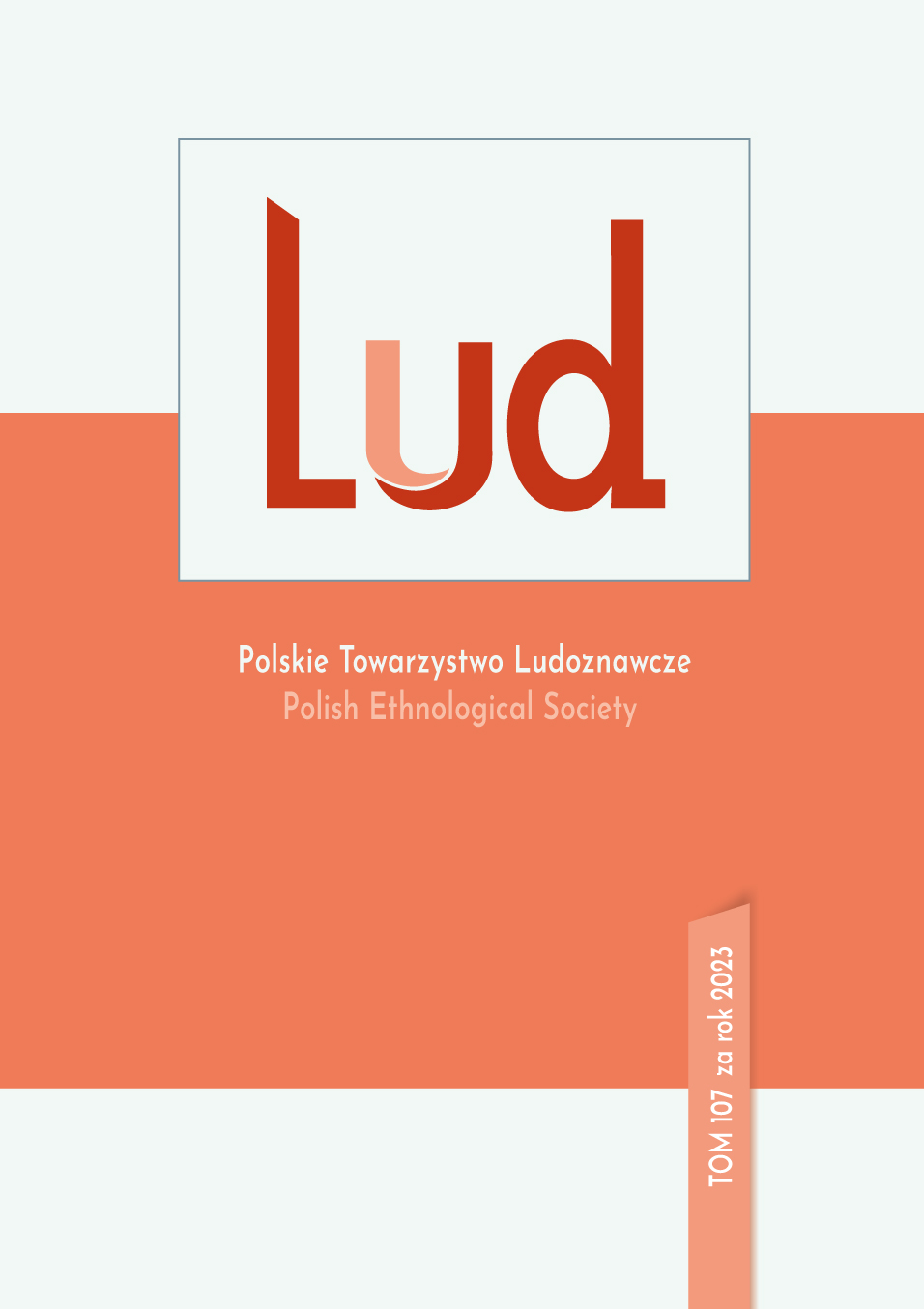Kryzys klimatyczny a lokalne praktyki wobec niematerialnego dziedzictwa kulturowego
Propozycja badań nad wybranymi zjawiskami Krajowej Listy Niematerialnego Dziedzictwa Kulturowego w Polsce z perspektywy etnoklimatologicznej
DOI:
https://doi.org/10.12775/lud107.2023.04Schlagworte
etnoklimatologia, etnografia klimatu, niematerialne dziedzictwo kulturowe, antropopresja, kryzys klimatycznyAbstract
W artykule prezentuję założenia pilotażowych badań terenowych pt. Analiza zależności między antropogenicznymi zmianami klimatu a lokalnymi praktykami wobec niematerialnego dziedzictwa kulturowego, które rozpoczęłam jesienią 2022 roku1. Zakładam, że wyniki badań umożliwią wstępną analizę wpływu kryzysu klimatycznego na ustalone tradycją obrzędy i zwyczaje związane z okresem wegetacyjnym, rocznym cyklem zalegania śniegu (por. Bolin 2009) oraz poziomem wód powierzchniowych. Artykuł nakreśla problem, obszar i metody badawcze, przyjęte perspektywy teoretyczne, m.in. etnoklimatologię i etnografię klimatu (Orlove, Chiang, Cane 2002; Crate 2011; Strauss 2018), zakres planowanych prac, a także wstępne wnioski.
Literaturhinweise
Bernecker, R. (2014). Concluding Remarks, w: S. von Schorlemer, S. Maus (eds.) Climate Change as a Threat to Peace. Impacts on Cultural Heritage and Cultural Diversity, Peter Land AG, Frankfurt nad Menem, s. 205-210.
Bolin, I. (2009). The glaciers of the Andes are melting: indigenous and anthropological knowledge merge in restoring water , w: S. A. Crate, M. Nuttall (eds.) Anthropology and Climate Change, Routledge, New York, s. 228–239.
Burszta, J. (1987). Folklor. W: Z. Staszczak (red.), Słownik etnologiczny. Terminy ogólne, Warszawa-Poznań: Państwowe Wydawnictwo Naukowe, s. 124-128.
Cocchiara, G. (1971). Dzieje folklorystyki w Europie. Warszawa: Państwowy Instytut Wydawniczy.
Crate, S. A. (2011). Climate and Culture: Anthropology in the Era of Contemporary Climate Change, Annual Review of Anthropology, 2011, Vol. 40, s. 175-194.
Deutsche UNESCO-Kommission (2019). German Inventory of Intangible Cultural Heritage, Bonn.
Dougherty, P. H. (2012). The geography of wine. Regions, terroir and techniques. Springer: Allentown.
Drabik, W. (1990). Cztery pory roku (O współzależności obrzędów dorocznych i rodzinnych), Polska Sztuka Ludowa - Konteksty t.44 z.1, s. 15-30.
Gruber S. (2011). The Impact of Climate Change on Cultural Heritage Sites: Environmental Law and Adaptation, Carbon & Climate Law Review 2011, Vol. 5, No. 2, s. 209-219.
Jigyasu, R. (2020). Managing Cultural Heritage In The Face Of Climate Change, Journal of International Affairs , Vol. 73, No. 1, s. 87-100.
Jones G.V., Reid R, Vilks A (2012). Climate, grapes, and wine: structure and suitability in a variable and changing climate, w: Dougherty P. H. (red.) The geography of wine. Regions, Terroir and Techniques, Springer, Allentown, s. 109–133.
Kolberg, O. (1871). Lud: jego zwyczaje, sposób życia, mowa, podania, przysłowia, obrzędy, gusła, zabawy,pieśni, muzyka i tańce. Krakowskie Cz.1, Poznań-Wrocław: Polskie Towarzystwo Ludoznawcze.
Kolberg, O. (1875). Lud: jego zwyczaje, sposób życia, mowa, podania, przysłowia, obrzędy, gusła, zabawy,pieśni, muzyka i tańce. Wielkie Księstwo Poznańskie Cz.1, Poznań-Wrocław: Polskie Towarzystwo Ludoznawcze.
Kowalski, P. (1990). Współczesny folklor i folklorystyka: o przedmiocie poznania w dzisiejszych badaniach folklorystycznych. Wrocław: Polskie Towarzystwo Ludoznawcze.
Krauss, R. (2009). Localizing climate change: a multi-sited approach, w: M. A. Falzon (red.), Multi-Sited Ethnography. Theory, Praxis and Locality in Contemporary Research, London: Routledge, s. 149-164.
Marcus, G. E. (1995). Ethnography in/of the World System: The Emergence of Multi-Sited Ethnography. Annual Review of Anthropology, 24, 95–117.
Milton, K. (2008). Anthropological perspectives on climate change. Australian Journal of Anthropology 19(l), s. 57-58.
Nowicki, A. (1884). Uprawa wierzb koszykarskich. Sylwan 2(03), s. 112-119.
Olędzki, J. (1994). Filodzoon. Ciesząca się życiem - albo - Ogławianie. Kultura wierzby, Polska Sztuka Ludowa - Konteksty, t.48 z.3-4, s. 90-99.
Orlove, B. S., Chiang, J. C. H., Cane, M. A. (2002). Ethnoclimatology in the Andes: A cross-disciplinary study uncovers a scientific basis for the scheme Andean potato farmers traditionally use to predict the coming rains, American Scientist, 90(5), s. 428–435.
Pieńczak, A., Kłodnicki, Z. (2002), Wierzenie o przebywaniu złego ducha w wierzbie (Salix), Komentarze do Polskiego Atlasu Etnograficznego (mapy),” Cyfrowa Etnografia, Dostęp 4 listopada 2022, https://cyfrowaetnografia.pl/items/show/8198.
Pijet-Migoń, E., Migoń, P. (2021). Linking Wine Culture and Geoheritage – Missing Opportunities at European UNESCO World Heritage Sites and in UNESCO Global Geoparks? A Survey of Web-Based Resources, “Geoheritage” 13, 71.
Ringbeck, B. (2014). World Cultural Heritage Sites and Climate Change: Management Issues, w: S. von Schorlemer, S. Maus (eds.) Climate Change as a Threat to Peace. Impacts on Cultural Heritage and Cultural Diversity, Peter Land AG, Frankfurt nad Menem, s. 199-205.
Rojas Blanco, A. (2006). Local initiatives and adaptation to climate change, “Disasters” 30(1), s,140−147.
Roncoli, C. (2006). Ethnographic and participatory approaches to research on farmers' responses to climate predictions, Climate Research 33, s. 81-99.
Rosenthal, E. (2008). Desert is claiming southeast Spain, “New York Times” 02.06.2008, https://www.nytimes.com/2008/06/02/world/europe/02iht-dry.4.13407203.html
Smyk, K. (red.) (2020). Procesja Bożego Ciała z tradycją kwietnych dywanów w Spycimierzu. Raport z badań i rekomendacje do planu ochrony, Uniejów: Miejsko-Gminna Biblioteka Publiczna w Uniejowie.
Strauss, S. (2018). Ethnoclimatology. 1-2. 10.1002/9781118924396.wbiea2305.
Sulima, R. (2000). Antropologia codzienności. Kraków: Wydawnictwo Uniwersytetu Jagiellońskiego.
Sulima, R. (2010). Folklor to technika bycia w świecie, która jest zawsze pod ręką – z Rochem Sulimą rozmawiają Żaneta Nalewajk i Agnieszka Wnuk, Tekstualia, 21(2), s. 5-20.
Downloads
Veröffentlicht
Zitationsvorschlag
Ausgabe
Rubrik
Lizenz
Copyright (c) 2023 Karolina Dziubata-Smykowska

Dieses Werk steht unter der Lizenz Creative Commons Namensnennung - Keine Bearbeitungen 4.0 International.
1. Autorzy udzielają wydawcy (Polskiemu Towarzystwu Ludoznawczemu) licencji niewyłącznej na korzystanie z utworu w następujących polach eksploatacji:
- utrwalanie Utworu/przedmiotu prawa pokrewnego;
- reprodukowanie (zwielokrotnienie) Utworu/przedmiotu prawa pokrewnego drukiem i techniką cyfrową (ebook, audiobook);
- wprowadzania do obrotu egzemplarzy zwielokrotnionego Utworu/przedmiotu prawa pokrewnego;
- wprowadzenie Utworu/przedmiotu prawa pokrewnego do pamięci komputera;
- rozpowszechnianie utworu w wersji elektronicznej w formule open access na licencji Creative Commons (CC BY - ND 4.0).
2. Autorzy udzielają wydawcy licencji nieodpłatnie.
3. Korzystanie przez wydawcę z utworu na ww. polach nie jest ograniczone czasowo, ilościowo i terytorialnie.
Stats
Number of views and downloads: 498
Number of citations: 0



